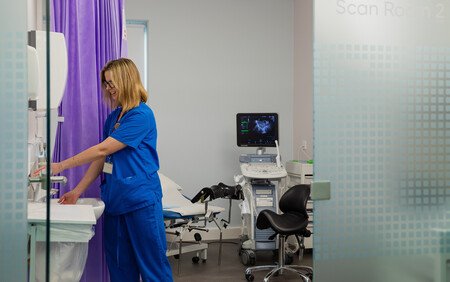
About Fertility
At Sims IVF, we aim to provide comprehensive information and resources to empower individuals on their reproductive health journey. Whether you're considering starting a family, preserving fertility for the future, or simply seeking knowledge about your body, we're here to support you every step of the way.
No matter what stage of building your family you are in, it’s important to understand the facts about your fertility.
Understanding female fertility
Every month from puberty to menopause, an egg is released from a follicle within one of the ovaries. This is referred to as ovulation and usually occurs around the middle of the menstrual cycle. The average menstrual cycle is 28-35 days.
The egg then travels along one of the fallopian tubes and if the timing is right, sperm may fertilise it on its way to the uterus. The egg survives for just 24 hours after leaving the ovary before it disintegrates. If fertilisation occurs, the embryo will continue to travel down the fallopian tube to the uterus, where it should implant in the endometrium. This typically happens seven days after ovulation.
The activity of the female reproduction system is controlled the release of hormones from both the brain and the ovaries that cause the development and release of eggs. It begins with the Follicle Stimulating Hormone (FSH) produced by the pituitary glad in the brain stimulating the growth of ovarian follicles in the ovary. A surge in the luteinising hormone (LH) triggers the release of the egg from the follicle, Progesterone then kicks in to build up and maintain the lining of the uterus. If the egg doesn’t fertilise or implant, the progesterone levels will fall and about 12-16 days later the blood and tissue from the lining of the uterus is shed in a process called menstruation.
Understanding male fertility
Sperm production starts in the testes, where the hormone testosterone is also produced. On average a healthy young man would produce on average 100 million sperm every day. After sperm is produced, it travels along the epididymis, where they mature along the way before exiting via the ductal structures called vas deferens and then out the urethra as part of the ejaculate. The entire process takes about 72 days. Sperm can survive for 2-3 days after ejaculation in the woman’s reproductive system.
Tips to help improve your chances of falling pregnant
The chance of a young fertile couple conceiving by having sexual intercourse at the time of ovulation is approximately one in five every month. Here are some health and lifestyle tips to help improve your chances of conceiving naturally.
Understand your fertile window: the most fertile days in your cycle are the days leading up to ovulation, before the egg is released from the ovary. We recommend couples have intercourse every two days throughout the fertile window. Find out more about calculating your fertile window.
Eat a healthy diet: It is recommended women take 0.5mg of folic acid supplements every day for at least three months before and into pregnancy to reduce the risk of neural defects.
Maintain a healthy weight: being significantly under or overweight can affect your chances of conception.
Stop smoking and recreational drug use: Smoking can reduce fertility and increase the chance of miscarriage.
Enjoy alcohol in moderation: Heavy drinking in men is known to affect sperm production. We recommend no more than 2 standard drinks per week and four for women while trying to conceive.
Moderate caffeine intake: We recommend no more than 2 cups of coffee a day.
What can affect fertility?
There are a number of factors than can affect both male and female fertility including health and lifestyle factors, the structure of function of the male or female reproductive systems; and/or hormonal and immune conditions. Learn more about infertility >
How do you test fertility?
A fertility specialist can assess your overall reproductive health and conduct some simple tests to identify any underlying causes of pregnancy delay. Learn more about common fertility tests >
When to seek help?
If you have been trying to conceive for more than 12 months (or 6 months if you are over 35 years of age) without success, we recommend you book an appointment with a fertility specialist.

Understanding Infertility
A couple isn’t considered infertile until they have been trying to conceive without success for over 12 months.

Fertility Tests
A fertility specialist can conduct some simple tests to identify any underlying causes of pregnancy delay.
